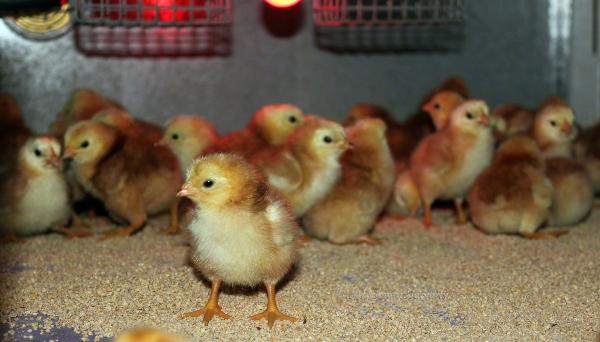
Chicks have several very basic needs: good food, clean water, and a warm, safe, and draft-free place to sleep and live. First things first: When you put your new chicks into their brooder, be sure to dip their beaks into the water gently several times to make sure they know where the water is. It’s a good idea to repeat this on the second day, just to ensure they figure it out. Line the brooder area with rough paper towel (newspaper is too slick); after about a week you can remove them and leave them right on the shavings. Food: Chicks need Chick Starter (not scratch or layer feed) which has a minimum of 18 - 20% protein. Feed this to them free-choice (as much as they want, leaving it out at all times) until they are about 12 weeks old, then gradually switch them to layer feed. They do not need grit while on chick starter crumbles (it comes built right in.) Medicated feed is usually preferred; it won’t hurt them and will prevent Coccidiosis from making them ill while they build up an immunity to it. Water: The first water you give your chicks should have about three teaspoons of sugar per quart of water. This gives them a bit of a kick-start on their first day. After that, you don’t need to add sugar. Clean water available at all times is necessary. Water should be changed at least once a day, and the container washed with soap and/or bleach water at least once a week. You can add in vitamins if you like, but they are not required; you can use the vitamin/electrolytes available for larger livestock, but only use a scant ¼ of a teaspoon per gallon of water. Warmth: Chicks need to be kept under a heat lamp for the first six or so weeks. Start out with the heat at 95 degrees, and reduce it by 5 degrees each week. Don’t use a heating pad; you need to give them a chance to move away from the heat if they are too warm. Keeping them free from drafts is very important, a rabbit cage is a bad place to raise chicks, even a cardboard box is better. Safety: Chickens are very vulnerable to predators, once they are big enough to go outside you must make sure the pen you keep them in is safe. Chicken wire is only good at keeping chickens in, not predators out. Neighbor dogs, raccoons, skunks, hawks, all are efficient chicken predators. Hardware cloth is good for pens; none of those can chew or tear through it. Health: The first week of a chick’s life is when they are the most vulnerable. You will need to check them every day to ensure they aren’t “pasting up”, which is where feces will clog their vent and prevent them from eliminating. If they do get pasted up, gently pull the dried feces away. Sometimes a bit of fluff will come with it, this should not be a problem and will grow back quickly so don’t worry about it. Remember, chickens can be done fancy or simple, it’s up to you. Have fun with your new birds! |

Chick Care
| All material copyright 2001 to present by Pathfinders Farm. All rights reserved. No material to be reproduced in any form without prior written permission |